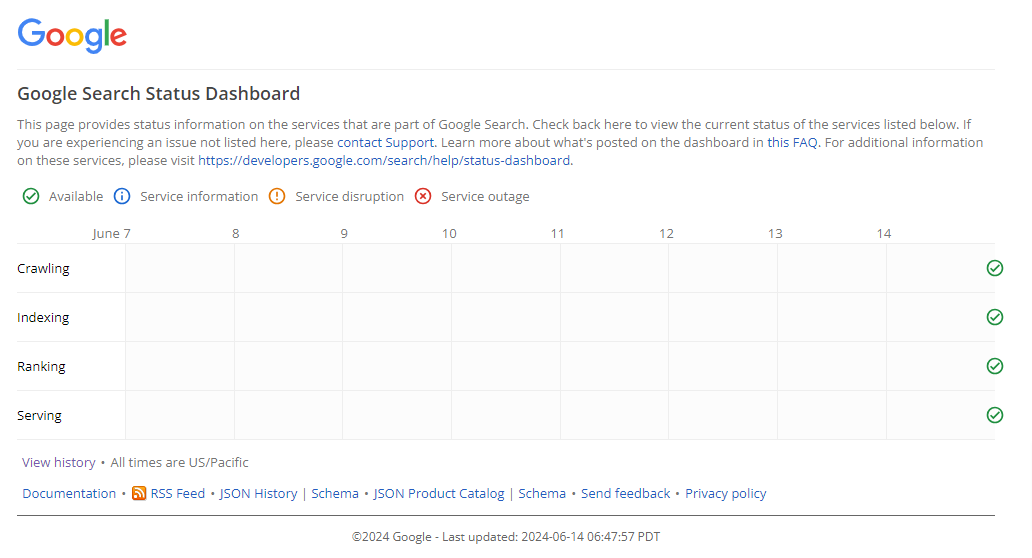Firstly, what actually is SEO?
SEO is an acronym for ‘search engine optimisation’. Essentially, it involves improving your website so that Google, Bing, or any other search engine likes it enough to put it higher in the search engine results page (SERP) when searching specific words or phrases.
However, each search engine has different criteria for what they deem is a website worthy enough for the top spot in the SERPs. For example, Google simply wants a great experience for the reader. Although this just scratches the surface. Making your website helpful is the overall mission that could help you win that sought-after number 1 spot.
Why is SEO so important?
In short, SEO helps your business get noticed by relevant people which can lead to more traffic to your site and, ultimately, more customers. When doing it right, SEO can help you attract the relevant audience and guide them towards becoming a customer.
Why do SEO myths exist?
Because algorithms change so frequently, things that worked a few months ago might be completely irrelevant now. Or something that was misinterpreted was passed on without actual proof that it works. That’s why it’s so important to keep up to date with the latest SEO news.
However, it’s easier said than done, and a lot of these SEO best practices become ingrained and circulated quickly leading to information that’s no longer relevant.
Our TOP 33 SEO myths
1. The ideal keyword density
A few years ago, there was a huge focus on getting the right number of keywords into your content. And a few years before then it was a case of stuffing as many keywords into your page as you possibly could. However, Google has confirmed that there is no ideal keyword density for SEO as this isn’t a ranking factor.
With the focus being on helpfulness and user experience, avoid keyword stuffing. We recommend including the target keywords in the page title, some subheadings, and naturally integrating them within your content.
2. LSI keywords boost rankings
LSI (latent semantic indexing) keywords are phrases that are semantically related to the keyword or topic. But they don’t exist. And this came from John Mueller directly. The myth is that if your page includes related keywords, that other ranking pages use in their content, your page will also rank well because Google will know your page is relevant.
However, the truth is that Google is smart enough to understand when content is relevant to the topic. And although there’s no harm in adding related keywords into your content, it’s not necessarily a ranking factor.
3. Only target high search volume keywords
High-volume keywords are the keywords that most people are searching for, so that would mean more traffic to your site, right?
Wrong.
Although there are way more people looking for products and services under these search terms, there is also way more competition. Instead, it’s better to target more niche keywords that are relevant and show intent. Choose a few keywords to include in your content with large and small search volumes so that your content remains rich and varied.
4. Low search volume keywords are a waste
Following on from point 3, low search volume keywords can transform your SEO. While they might seem like a waste of time, they don’t have a lot of competition which you can use to your advantage. Because there are not many people targeting this low-volume search term, it’s easier to rank. And you’re more likely to win the sale if there are not many others providing the same product as you.
It’s a low-risk, high-reward situation!
5. Google penalises duplicate content
Contrary to popular belief, Google doesn’t actually penalise duplicate content. Well, unless it’s done to be deceptive and manipulative of search engines. And this comes straight from the horse’s mouth.
What Google does do, is show you the best result out of the cluster of duplicate content in the SERP and filter out the others. This also takes into consideration content that is rewritten or republished without any added value.
6. Long-form content performs better
Again, we’ve always been told to write more and fill the page with information. But when you think about whether you would like to sit and read a 2000-word article every time you want to find out a quick bit of information, you can see why this might be a myth.
Just like long-form content is great for going into sufficient detail about deep topics, short-form content is perfect for delivering small bits of information.
7. More content is better
Although you may think pumping out loads of content will get you more engagement, you’re mistaken. Your audience is looking for valuable content, not just posting for the sake of it. Focus on just a few well-written, information-rich posts to educate and connect.
8. Meta descriptions are a ranking factor
Meta descriptions are great for giving people on the SERP a summary of what they can find on your page. However, Google doesn’t consider them a ranking factor. Therefore, although they’re helpful on the search results page, they can be pushed down the priority list.

9. Mobile responsiveness isn’t important
Like it or not, mobile traffic is taking over desktop traffic, and it has been for a while with 90% of internet users accessing the internet using a mobile phone. Google has therefore moved to mobile-first indexing, meaning they crawl mobile versions of websites rather than desktop ones as, globally, this is the preferred method of browsing. And from July 2024, Google will be only be crawling sites that are mobile friendly. This essentially means that if your website isn’t accessible with a mobile device, it won’t be indexed at all.
10. All backlinks are good
Gone are the days when getting as many backlinks as possible was a great SEO tactic. Now, if a site linking to yours is deemed untrustworthy and doesn’t have credibility, it can actually damage your ranking and tarnish you with the same brush. Instead, go for good quality links in your link-building strategy from credible sites to avoid looking like you’re buying your links.
11. SEO is a “one and done” task
SEO isn’t just something you can tick off your to-do list and move on, it’s an ongoing investment. with things evolving so quickly in the digital world, it’s important you keep on top of your website by updating, testing, and producing content to keep your audience engaged.
12. Local SEO isn’t worth doing
Although the bigger keywords may seem more attractive to target, local SEO is where it’s at – especially if you’re providing services in specific areas. Local SEO is vital if you want to get noticed by customers in your area, and it also helps drive more awareness once you start getting people through the door.
13. New content is needed to rank higher
Fresh content is a huge ranking factor when it comes to Google, but that doesn’t mean you need to pump out new content left, right, and centre. ‘Fresh’ also refers to refreshing the existing content on your site. For example, a blog post you wrote three years ago about the best phones on the market probably won’t be relevant anymore.
Going through old content and making it relevant for right now will show Google your content is still relevant and that you’re putting out fresh information.
14. Google will be replaced with AI
A common myth that’s been floating around the SEO world is that AI will eventually replace Google. Although AI is pretty much dominating a range of industries, Google is here to stay. However, Google has introduced AI features like chatbots, voice search, and image search that are intended to improve the search experience.
15. SEO only matters for large businesses
Many people think only companies with huge marketing budgets should worry about SEO, however, this is completely false! With the right SEO strategy, even small businesses can get their name out there and compete with some of the bigger players on the field.
While it’s true that larger budgets can provide more comprehensive strategies, even small investments can noticeably improve your rankings.
16. You don’t need to conduct keyword research
You need to know the data around the keyword you’re targeting. Otherwise, how do you know it’s a good one? We know it can be a bit of a boring task, but keyword research ensures you’re targeting keywords to drive relevant traffic to your page.
17. Sitemaps improve SEO rankings
Many people think if you have a sitemap, you’ll instantly boost your rankings. However, despite what you’ve heard, sitemaps don’t guarantee that you’ll rank higher in search results. Don’t get us wrong, they’re still a crucial part of your website that helps Google find and index your pages, but it isn’t a ranking factor.
18. You should only focus on backlinks
Backlinks are an important factor in SEO, but it shouldn’t be your primary focus. One of the most common myths is that you should put the majority of your efforts into earning backlinks when, realistically, you should also focus on internal links to keep leads engaged on your site.
19. If you’re not position 1 your SEO is failing
Who doesn’t want position 1 on Google? But it’s not the be-all and end-all if you’re not. One of the most common misconceptions about SEO is that if you aren’t ranking in the first position, your SEO is failing leading to many businesses just giving up.
But it’s simply not true.
SEO takes a lot of time, so you might just need to give it more time or tweak strategies to start to see some improvements.
20. Using Google Ads will increase organic rankings
Google Ads and organic search results are separate entities within Google’s search engine. Google Ads is a pay-per-click advertising platform whereas organic search results are the non-paid listings that appear beneath the sponsored results on the SERP.
Although using Google Ads to get quick clicks is great for short-term gains, it doesn’t actually affect your overall ranking once you stop paying.
21. Google respects the canonical URL
Just because you set a URL as the preferred version for indexing, it doesn’t mean Google will respect your wishes. Google can choose a page other than the canonical URL to be a better option to show in search.
22. Google updates result in algorithmic penalties
Despite what you may think, Google doesn’t change its algorithm to catch you out and penalise websites – although it can often feel like that! The algorithm changes are there to improve the quality of search results by showing websites that provide high-quality, relevant information. To avoid penalties, the best strategy is to focus on producing a high-quality, relevant, and user-friendly website that fits the needs of your audience.

23. Google Sandbox
Google Sandbox is an SEO myth that claims to be a virtual probation area that new websites are placed in by Google to be able to more carefully evaluate if they follow guidelines. The Sandbox apparently restricts websites from ranking well in Google SERPs during the probation period. However, it’s not actually confirmed whether Google Sandbox is real or not. Either way, it’s important to make sure your website uses only White Hat SEO practices.
24. Tabbed content affects rankings
Tabbed content started as a solution for keeping your page looking clean and content easier to digest. It provided the reader with a way to show and hide content through a click of a button. However, many believe that Google won’t assign as much value to this content as it’s hiding behind a tab.
But don’t worry, Google debunked this myth in 2020. As long as the content is visible in the HTML, there’s no reason to assume it’s being devalued. So continue to add tabbed content to your heart’s content!
25. SEO takes 3 months
A popular timeframe that SEO-ers tell their clients is 3 months to start seeing results – you’ve probably heard this yourself. However, although it does take a bit of time for SEO to start showing results, 90 days is more of a reasonable timeframe to see whether your SEO efforts are showing good or bad results. And if you’re choosing to target more competitive keywords, it could be much longer than 3 months before you start seeing results.
26. Bounce rate is a ranking factor
It’s a bit misunderstanding among many digital marketers that bounce rate plays a big role in ranking websites. However, a good bounce rate isn’t always a guarantee for getting higher up the SERP. Even John Mueller himself stated:
“I think there’s a bit of a misconception here that we’re looking at things like the analytics bounce rate when it comes to ranking websites, and that’s definitely not the case.”
27. Keywords in your URLs are very important
For years, many people have assumed having keywords in your page URLs was essential to rank better. But the truth is, they’re optional. It definitely doesn’t hurt adding them in there, but it shouldn’t be something you worry about. Focus on naturally getting relevant terms into your main content to really make an impact.
28. Well known websites will always outrank unknown websites
Well-known websites are generally found near the top of search results, but that’s simply because bigger brands usually have more resources than smaller brands, so they can invest more in their SEO. Big brands are also often more authoritative than smaller brands. But this doesn’t mean they will always win the top spot.
Smaller brands targeting long-tail keywords or local SEO terms can help them establish a local presence and can even be more relevant in search results than well-known websites. So, don’t give up on your SEO efforts – it’s not entirely impossible to outrank the big dogs!
29. You need ‘near me’ to rank locally
Although typing in, for example, ‘bakeries near me’ is an everyday occurrence for many people, bakeries in the user’s specific location don’t actually need to add ‘near me’ into their content. This is because Google understands the user’s location and the intent of your page. So as long as your page is relevant to the user’s location, Google can easily connect the dots.
30. Google has 3 top ranking factors
One myth that is commonly circulated is that Google has 3 top ranking factors. In reality, there are over 200 ranking signals (like content quality, backlinks, mobile-friendliness, page speed, domain age etc.) that all contribute towards determining where your website is positioned in the SERP.
31. Use your disavow file to maintain a website’s link profile
Some people believe that you need to regularly use the disavow file to keep your link profile clean, but that’s not true. The disavow tool is meant for extreme cases of spammy links hurting your site. But Google is pretty good at ignoring bad links on its own. Overusing this tool can actually harm your site by getting rid of good links, so use it wisely!
32. Crawl budget isn’t an issue
A common myth is that crawl budget isn’t something most websites need to worry about. While it’s true that smaller sites may not face an issue with it, larger sites with hundreds of thousands of pages definitely need to consider it.
Crawl budget is essentially the number of pages Google bots crawl and index within a given timeframe. If your site has too many pages, you need to make sure the important pages get crawled and indexed. Ignoring crawl budget could lead to a lot of your site being overlooked by search engines which can affect your visibility in the SERPs.
33. You should believe an SEO agency that guarantees results
Finally, should you believe when an SEO agency guarantees you those first page results for large keywords and rapidly increasing organic traffic? The short answer is: you should be sceptical. While it’s nice hearing all the things you want to hear, these promises can never be guaranteed.
SEO needs vary from business to business, and with search engines constantly evolving, it can be almost impossible to guarantee results in a specific timeframe. SEO has no fixed timeline, and increased traffic and rankings can often take time to manifest. Even Google itself said:
“Be wary of an expert who gives unrealistic guarantees of ranking first on Google. No one can guarantee that.”
An SEO agency you can trust is one that offers transparency, commitment to ethical SEO practices, has a proven track record of results and testimonials, and takes a customised approach to SEO for your business.
How to separate SEO fact from fiction?
With so many SEO myths around, it can be hard to know which ones are actually true. However, by consulting reputable sources like Google’s Webmaster Guidelines, Moz, and Search Engine Journal, and following industry experts like John Mueller and Danny Sullivan, you can gain reliable insights. Experiment with small changes and monitor your results, SEO is all about trial and error!
Stay updated by subscribing to SEO newsletters, attending webinars, and engaging in forums. SEO is a long-term strategy with no shortcuts, and if something sounds too good to be true, it probably is.
Need help with your SEO?
If you want help improving your website from people who know what they’re talking about, we can help. We offer customised SEO strategies for a range of businesses with a transparent approach. Our team of SEO specialists stay up to date with the latest SEO trends and algorithm updates so you don’t have to. We use proven techniques to boost your rankings, drive organic traffic, and increase conversions with detailed reports so you can see the real impact of our efforts.
Contact us today and let’s transform your online presence.




Newsletter sign up
Lorem ipsum dolor sit amet, consectetur adipiscing elit. Nam vitae ante eu purus cursus aliquam. Pellentesque blandit viverra metus, a malesuada libero commodo eu.